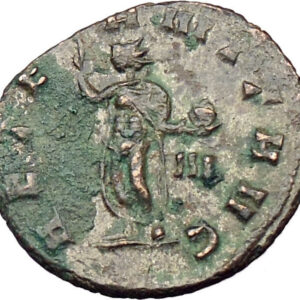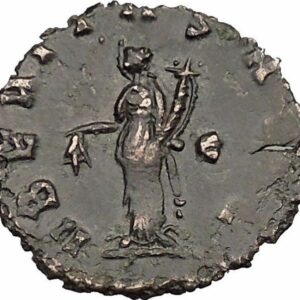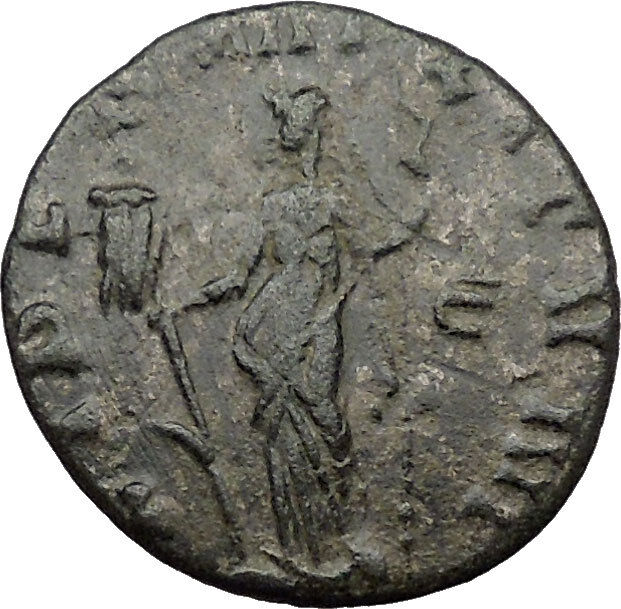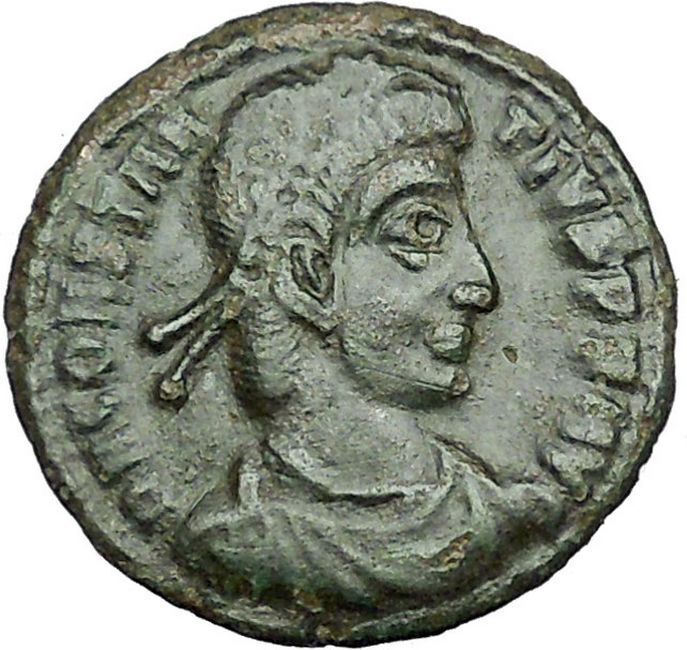|
Julia Maesa – Augusta: 218-224 A.D.
Silver Antoninianus 19mm (3.00 grams) Rome mint 218-222 A.D.
Reference: RIC 264 (Elagabalus)
IVLIA MAESA AVG, Diademed, draped bust right on crescent.
PIETAS AVG, Pietas standing left, sacrificing over altar and holding incense box.
You are bidding on the exact item pictured, provided with a Certificate of Authenticity and Lifetime Guarantee of Authenticity.
In Roman mythology, Pietas was the goddess of duty to one’s state, gods and family and a personification of the Roman virtue of pietas. One of the di indigetes, her main temple was a 2nd century BC one in the Forum Holitorium. This goddess was often depicted on the reverses of Roman Imperial coins with women of the imperial family on the obverse, as an appropriate virtue to be attributed to them (eg Flavia Maximiana Theodora, right). The imperial women might even appear in the goddess’s guise (eg Livia here and Salonina Matidia here).
Julia Maesa – Augusta 218-224/225 A.D.
| Sister of Julia Domna | Sister-in-law of Septimius Severus | Mother of Julia Soaemias and Julia Mamaea | Grandmother of Elagabalus and Severus Alexander | Aunt of Caracalla and Geta |
 Julia Maesa (7 May ca. 165 AD-ca. 3 August 224) was a Roman citizen and daughter of Julius Bassianus, priest of the sun god Heliogabalus, the patron god of Emesa (modern Homs) in the Roman province of Syria. Grandmother of both the Roman emperors Elagabalus and Alexander Severus, she figured prominently in the ascension of each to the title at the age of fourteen. Julia Maesa (7 May ca. 165 AD-ca. 3 August 224) was a Roman citizen and daughter of Julius Bassianus, priest of the sun god Heliogabalus, the patron god of Emesa (modern Homs) in the Roman province of Syria. Grandmother of both the Roman emperors Elagabalus and Alexander Severus, she figured prominently in the ascension of each to the title at the age of fourteen.
Like her younger sister Julia Domna, she was among the most important women to exercise power behind the throne in the Roman empire.
Julia Maesa was married to Syrian noble Julius Avitus and had two daughters Julia Soaemias and Julia Avita Mamaea each one mother of an emperor. Following the accession to the throne of her brother in law Septimius Severus, Julia Maesa moved to Rome to live with her sister. After the murder of her nephew, the emperor Caracalla, and the suicide of Julia Domna, she was compelled to return to Syria. But the new emperor Macrinus did not proscribe her and allowed her to keep her money.
Once back in Syria and possessed of ample funds, Maesa engaged in a plot to overthrow Macrinus and place one of her grandsons, Elagabalus son of Julia Soaemias, in his place. In order to legitimise this pretension, mother and daughter fomented the rumor that the 14 year old boy was Caracalla’s illegitimate son. The two Julias were successful, mainly due to the fact that Macrinus was of an obscure origin without the proper political connections, and Elagabalus became emperor.
For her loyalty and support, Elagabalus honored Julia Maesa with the title Augusta avia Augusti (Augusta, grandmother of Augustus). When the teenager proved to be a disaster as emperor scorning Roman values with both religious and sexual scandals (even taking the liberty of marrying a Vestal virgin among a rumored five wives during his brief four years reign), Julia Maesa decided to promote instead her fourteen year-old grandson Alexander Severus.
She convinced Elagabalus to adopt Alexander as his heir and he was murdered shortly afterwards by the praetorian guard alongside his mother, both being thrown into the Tiber river in contempt after being dragged from the palace and through the streets, when a rumor circulated that Alexander had died.
Julia Maesa died in an uncertain date around 226 and like her sister Domna before her, was deified.
|





 Julia Maesa (7 May ca. 165 AD-ca. 3 August 224) was a Roman citizen and daughter of Julius Bassianus, priest of the sun god Heliogabalus, the patron god of Emesa (modern Homs) in the Roman province of Syria. Grandmother of both the Roman emperors Elagabalus and Alexander Severus, she figured prominently in the ascension of each to the title at the age of fourteen.
Julia Maesa (7 May ca. 165 AD-ca. 3 August 224) was a Roman citizen and daughter of Julius Bassianus, priest of the sun god Heliogabalus, the patron god of Emesa (modern Homs) in the Roman province of Syria. Grandmother of both the Roman emperors Elagabalus and Alexander Severus, she figured prominently in the ascension of each to the title at the age of fourteen.




